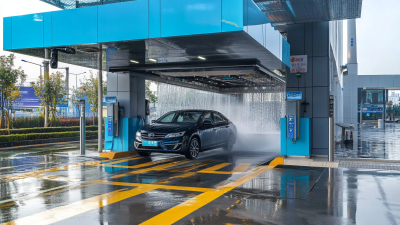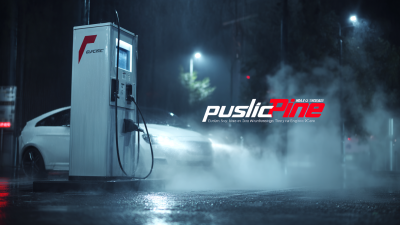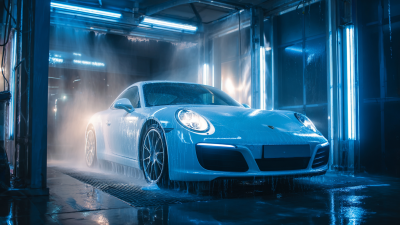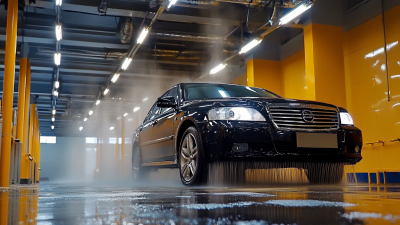Exploring Innovative Alternatives to Traditional Car Wash Machines for Efficient Cleaning Solutions
As the automotive industry continues to evolve, the demand for efficient and environmentally friendly cleaning solutions is more pressing than ever. Traditional car wash machines, while prevalent, often consume excessive water and energy, contributing to increased operational costs and environmental concerns. According to a report by IBISWorld, the car wash industry generates approximately $12 billion in revenue annually in the United States alone, highlighting the need for innovative alternatives that can enhance efficiency while minimizing ecological footprints.

With an increasing number of consumers and businesses striving for sustainable practices, exploring cutting-edge technologies and methods beyond conventional car wash machines is not only beneficial but essential. This guide delves into effective alternatives that promise to revolutionize the way we think about vehicle cleaning, offering insights into their advantages, implementation challenges, and the future of car wash services in a rapidly changing market.
Emerging Technologies Transforming Car Wash Experiences
The car wash industry is undergoing a significant transformation, driven by emerging technologies that enhance cleaning efficiency while promoting sustainability. Recent reports from industry analysts indicate that the global car wash services market is projected to reach $49 billion by 2027, growing at a compound annual growth rate (CAGR) of 4.2%. This growth is fueled by innovations such as touchless car wash systems and automated water reclamation technologies, which not only improve the cleaning process but also conserve water by up to 80% compared to traditional methods.
Artificial intelligence (AI) and machine learning are playing a pivotal role in reshaping the car wash experience. By leveraging data analytics, modern car wash facilities can now personalize services based on customer preferences and vehicle conditions. According to a recent survey conducted by IBISWorld, nearly 60% of consumers prefer automated systems that provide seamless transactions and tailored cleaning options.
Additionally, the integration of mobile applications allows customers to schedule washes, track their vehicle's cleaning history, and even receive real-time updates, significantly enhancing convenience and customer satisfaction. As these technologies emerge, the car wash landscape continues to evolve, setting new standards in efficiency and eco-friendliness.
Sustainable Practices in Automotive Cleaning Solutions
As the automotive industry continues to evolve, the need for sustainable practices in cleaning solutions has become increasingly apparent. Traditional car wash machines, while efficient, often consume large quantities of water and utilize chemicals that can be harmful to the environment. Innovative alternatives are now emerging that prioritize sustainability without sacrificing effectiveness. For instance, waterless car wash products employ biodegradable agents to lift dirt and grime, significantly reducing water usage while ensuring a thorough clean.
Moreover, mobile eco-friendly cleaning services are gaining traction, bringing cleaning solutions directly to consumers. These services typically use advanced steam-cleaning technology that minimizes water consumption and eliminates the need for harsh chemical detergents. By adopting practices such as these, both consumers and businesses can contribute to a more sustainable future in automotive care. In addition, many of these approaches embrace the principles of circular economy, recycling materials wherever possible and minimizing waste. As the industry progresses, the combination of innovation and sustainability will not only enhance cleaning processes but also protect our planet for generations to come.
Comparative Analysis: Traditional vs. Innovative Car Wash Methods
 When it comes to car washing, traditional methods often rely on automated machines that spray water and detergent, followed by mechanical brushes to scrub the surface. While effective, these methods can lead to scratches and swirls on paint finishes, not to mention significant water usage. In contrast, innovative alternatives are emerging, leveraging advanced technologies such as biodegradable products, waterless cleaning solutions, and steam cleaning. These modern techniques not only reduce environmental impact but also promise a gentler approach to maintaining a vehicle's finish.
When it comes to car washing, traditional methods often rely on automated machines that spray water and detergent, followed by mechanical brushes to scrub the surface. While effective, these methods can lead to scratches and swirls on paint finishes, not to mention significant water usage. In contrast, innovative alternatives are emerging, leveraging advanced technologies such as biodegradable products, waterless cleaning solutions, and steam cleaning. These modern techniques not only reduce environmental impact but also promise a gentler approach to maintaining a vehicle's finish.
A comparative analysis reveals that traditional car wash machines generally consume more resources and may produce less thorough cleaning results, especially in hard-to-reach areas. Meanwhile, alternatives like hand washes or mobile detailing services present a more customizable approach, allowing for precise attention to detail. Waterless car washes utilize special sprays that encapsulate dirt, enabling easy wipe-off without the need for rinsing – a huge advantage for both convenience and water conservation. Ultimately, the choice between traditional and innovative car wash methods hinges on the balance between efficiency, environmental responsibility, and the level of care desired for a vehicle’s appearance.
Customer-Centric Innovations in Vehicle Cleaning Services
As the automotive cleaning industry evolves, the focus has shifted towards customer-centric innovations that enhance the vehicle cleaning experience. According to a 2022 report by IBISWorld, the car wash industry in the U.S. alone is valued at approximately $11 billion, with a projected annual growth rate of 3.9%. This growth is driven not only by the demand for efficient services but also by the introduction of new technologies aimed at improving customer satisfaction.

Innovative alternatives to traditional car wash machines are emerging, such as mobile wash services and eco-friendly cleaning solutions. A survey conducted by the International Carwash Association found that 76% of customers prefer services that offer environmentally conscious products. This demand has prompted companies to develop biodegradable soaps and water-efficient washing techniques, which not only satisfy eco-minded consumers but also enhance the overall effectiveness of the cleaning process.
Moreover, advancements in digital technology, such as mobile apps for scheduling and real-time service tracking, are providing customers with unprecedented convenience and control over their vehicle cleaning needs, aligning services more closely with consumer preferences.
The Role of Automation and Robotics in Modern Car Wash Systems
As the automotive industry embraces automation and robotics, modern car wash systems have also begun to integrate these advanced technologies for enhanced efficiency. According to a report by IBISWorld, the car wash industry in the U.S. is projected to reach $11 billion by 2025, driven largely by the adoption of automated washing solutions. These innovations not only increase throughput but also significantly reduce water consumption. Automated systems can use up to 30% less water compared to traditional hand-wash methods, aligning with the growing emphasis on sustainability.
Robotics plays a crucial role in improving the overall customer experience and operational efficiency. Companies like SoftWash Systems have developed robotic arms that meticulously clean the vehicle's surface while minimizing the risk of scratches or damage. Reports indicate that car washes employing automation can handle up to 120 cars per hour, compared to 30 cars with manual washing. This not only boosts revenue potential but also allows for quicker service, catering to the time constraints of today’s customers. As these technologies evolve, the car wash industry is set to become more efficient and eco-friendly, paving the way for a new era in vehicle maintenance.
Exploring Innovative Alternatives to Traditional Car Wash Machines for Efficient Cleaning Solutions
| Technology | Description | Efficiency (%) | Water Usage (Liters) | Installation Cost ($) |
|---|---|---|---|---|
| Automated Foam Brush System | Utilizes foam for thorough cleaning, reducing friction. | 90% | 30 | 5000 |
| Waterless Car Wash Solutions | Uses biodegradable sprays to clean without water. | 85% | 0 | 3500 |
| Robotic Foam Applicators | Automated robots that apply foam for uniform coverage. | 95% | 25 | 8000 |
| High-Pressure Water Jets | Uses high-pressure jets for deep dirt removal. | 88% | 45 | 6000 |
| UV Sterilization Stations | UV lights sanitize surfaces while cleaning. | 80% | 20 | 7000 |
Related Posts
-

7 Key Advantages of Using an Electric Car Wash Machine for Your Business
-

Top 10 Automatic Car Wash Equipment Manufacturers from China at the 137th Canton Fair
-

7 Reasons the Best Electric Car Wash Machine is Revolutionizing Auto Care
-

Ultimate Guide to Choosing the Best Automatic Home Car Wash System for Your Needs
-

Unlocking Success with Best Touchless Car Wash Machine 7 Key Industries Transforming Vehicle Cleaning
-

Unmatched Quality from China's Leading Factory for the Best Auto Car Wash Machine